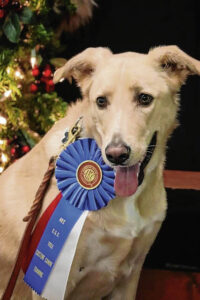
CHARLOTTESVILLE – Eastern Hancock is hoping to add two furry new members to its staff. The school corporation plans to welcome therapy dogs onto campus, and the canine candidates in training are dogs owned by the superintendent and high school principal.
Rosie, owned by Superintendent George Philhower; and Dierks, owned by high school and middle school Principal Adam Barton, are currently taking classes that would grant them the ability to serve as therapy dogs at EH.

The Eastern Hancock School Board approved a potential therapy dog program at its December meeting, and Philhower announced in his most recent newsletter to parents that the program was in development.
Philhower said the idea to bring service dogs onto campus was initially raised last year, when teachers approached Barton about it. It came up again over the summer as Philhower, in his first months as superintendent, met with staff to learn about what they wanted to see at Eastern Hancock schools.
Philhower and Barton both had dogs who were receiving training at the time, and they decided to see if their own pets had the skills to become therapy dogs. Custom Canine Training offered to give the dogs free instruction.
Rosie and Dierks have both received a “Canine Good Citizen” certificate, meaning they’ve received training in following commands and the basics of positive behavior. Over the next few months, the two will be logging hours to receive official certification as therapy dogs.
“We’ll see if they have what it takes to finish things out,” Philhower said.
Rosie, a “labradoodle” Labrador and poodle mix, is still a puppy; she’ll need to wait until she’s a year old this spring to be certified as a therapy dog.
Dierks, a German shepherd and Labrador mix, was adopted by Barton’s family about a year and a half ago. Barton said Dierks has been doing well in training and recently visited the high school to get used to the sights, sounds and smells of a busy campus. The reception, Barton said, was immediately positive.
“It was just incredible to watch people react to dogs in the building. It just changes the mood,” he said.
Barton said he plans for Dierks to spend most of his time at the high school principal’s office and guidance office, where he hopes that visiting with a friendly dog will help students feel less anxious about spending time in a part of the school building that can be stressful for them. An EH teacher and secretary will both receive special training on working with a therapy dog when Barton isn’t available.
Philhower said several teachers in the corporation have shown interest in receiving the training to work with therapy dogs, and more dogs could be included in the program in the future. In the newsletter sent to parents, he also said the corporation is aware that some children have an allergy to or a fear of dogs, and school leaders and will be mindful of those concerns. Parents will receive advance notice if a therapy dog will be visiting their child’s classroom.
Studies of therapy dogs in schools have shown that the presence of four-legged friends who interact with students can have benefits like a decrease in stress and anxiety and improved school attendance.
Mt. Vernon Community School Corporation has a therapy dog program, but suspended it due to COVID-19. Harold Olin, superintendent of Greenfield-Central schools, said the corporation doesn’t have its own therapy dog but has had them visit the campus in the past.
“They certainly have a calming effect, and I think they can be very helpful,” Olin said.